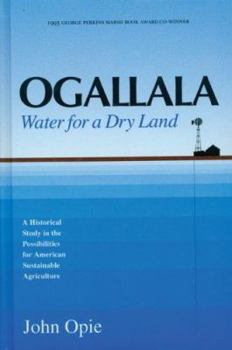Ogallala: Water for a Dry Land
Select Format
Select Condition 
Book Overview
In this new, enlarged edition, John Opie updates his groundbreaking work on the environmental history of the Ogallala aquifer and plains farming. He addresses the impact of the 1996 Farm Bill (Federal Agricultural Improvement and Reform Act) and looks at the recent movement of industrial hog farming onto the plains. Opie also develops his argument for the plains as a "moral geography, " a view involving the recognition by society that it has an obligation to balance the responsibility for conserving natural resources with that for keeping a regional people-the family farmers-in operation.
Format:Hardcover
Language:English
ISBN:0803235577
ISBN13:9780803235571
Release Date:January 1993
Publisher:Unp - Nebraska
Length:412 Pages
Weight:1.80 lbs.
Dimensions:1.4" x 6.3" x 9.3"
Customer Reviews
1 rating
A very good introduction to this topic
Published by Thriftbooks.com User , 24 years ago
A few years ago I came across a magazine article that discussed the importance of the Ogallala Aquifer to American agriculture, geography, and society. Realizing that I knew absolutely nothing about this topic I picked up John Opie's book. It's safe to say that I now know more about the Ogallala Aquifer than I could ever have imagined possible.The book begins with a discussion of the geology of the aquifer, and then moves into the history of irrigation efforts on the Plains since the 19th century, and finally to a discussion of the various irrigation technologies currently used to exploit the aquifer. There is ample discussion along the way about how these technologies have changed over the years as environmental consciousness and the problems of declining aquifer levels have become more prevalent. This book is not only a very informative look at the Ogallala Aquifer but is pleasantly readable as well. And now that it is (finally) available in a more affordable paperback edition, I'm going to go buy a copy for myself.






